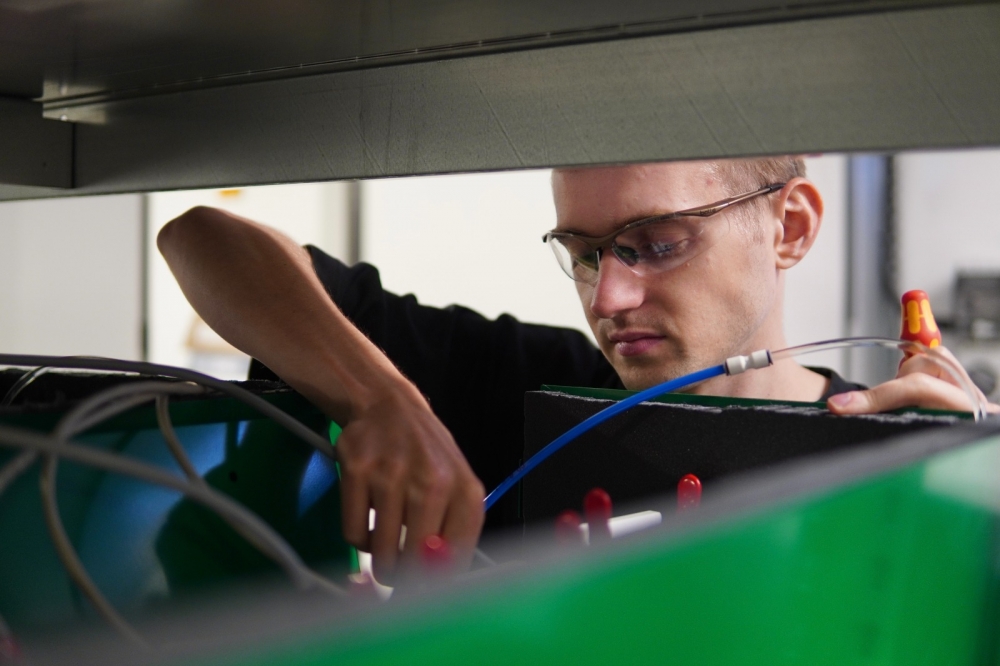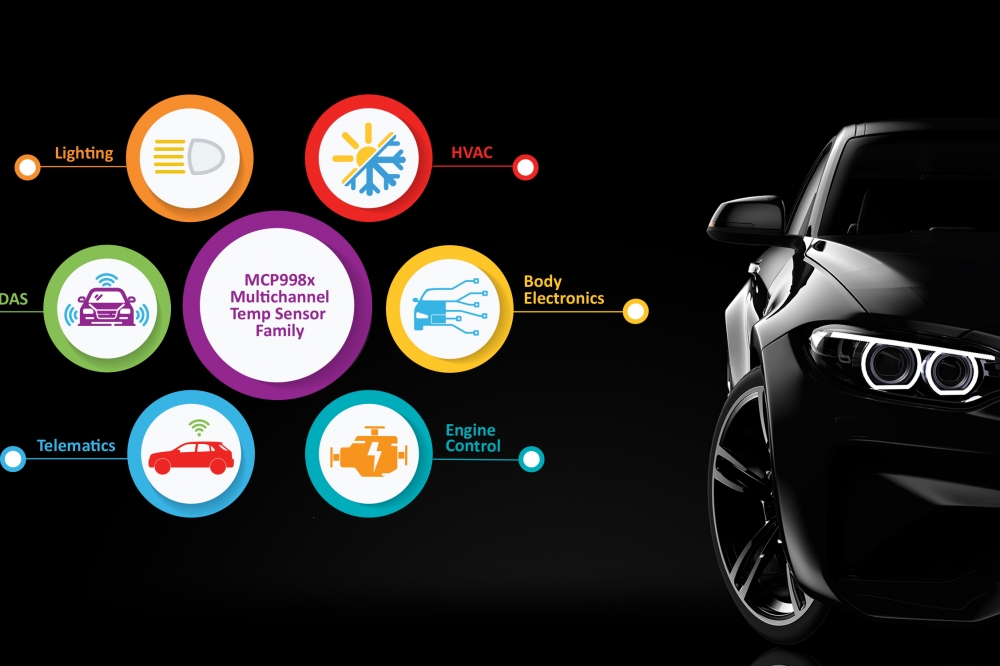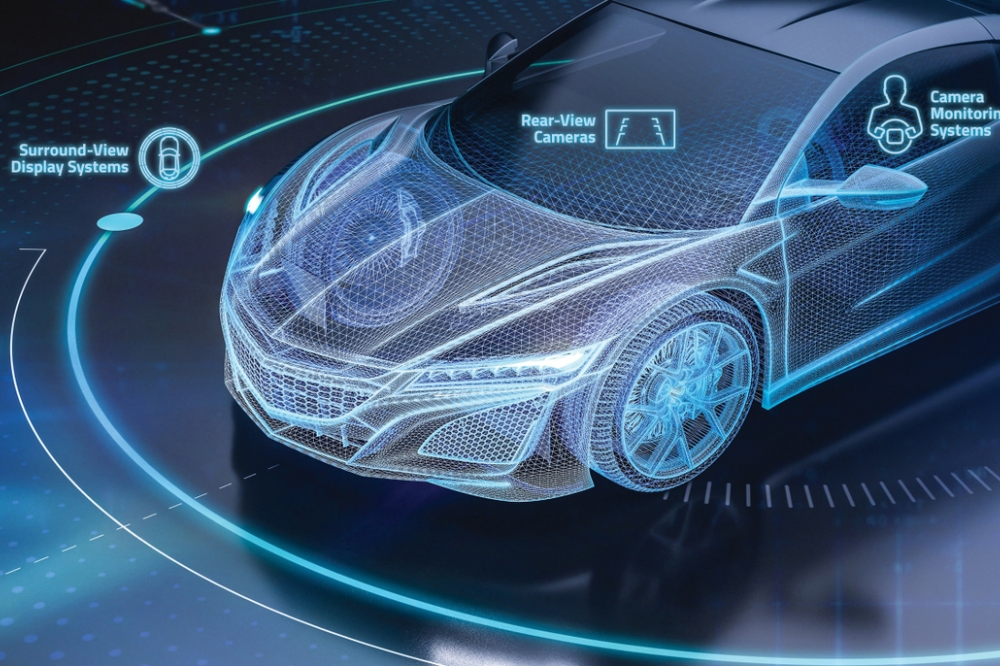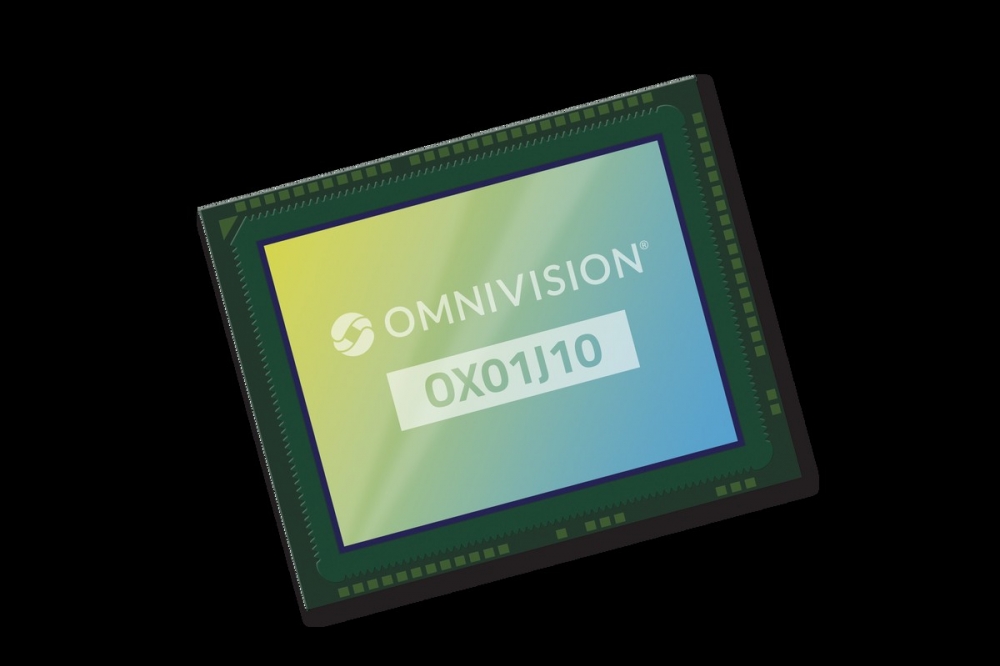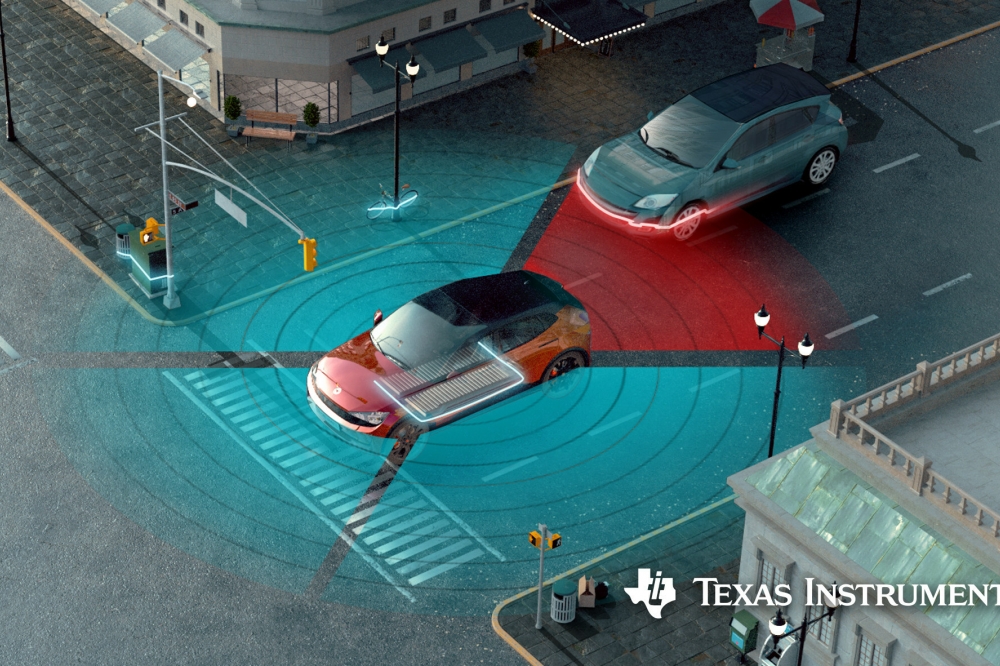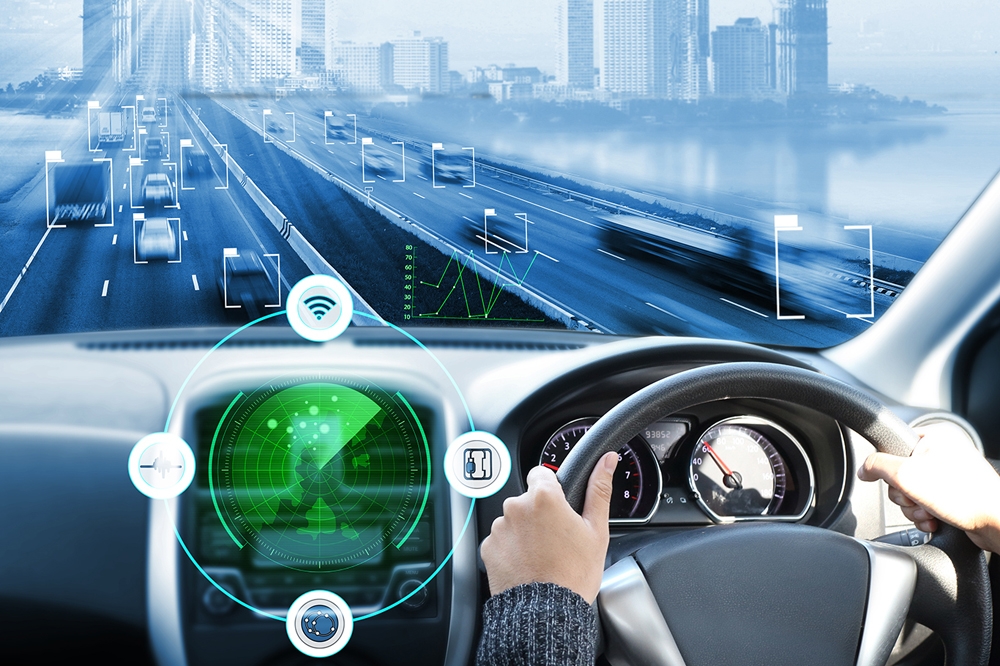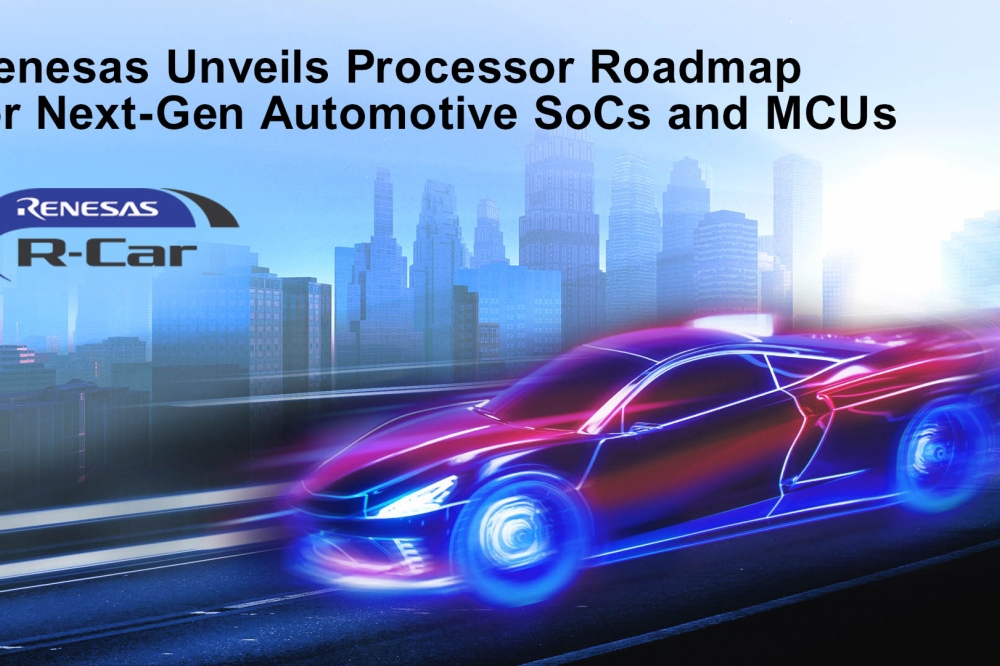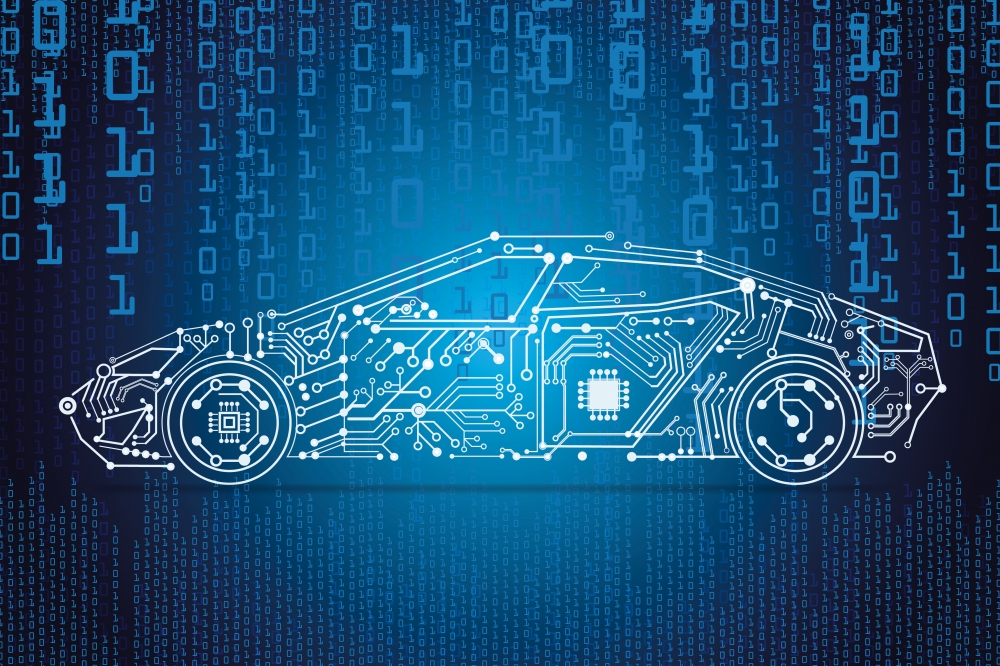Volkswagen explores the future of automotive AI in the Motor City
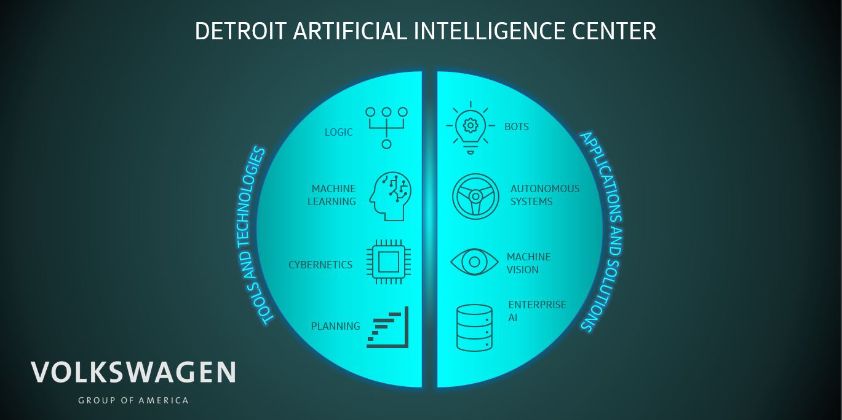
{inStory1}
Artificial intelligence (AI) has become a popular catchphrase in technology, even if most people couldn’t exactly define what it really is. One promise of AI lies in finding patterns across huge datasets that make everyday business smarter and more efficient – and for Volkswagen in North America, the hub of AI development lives in Detroit.
“We want to leverage new opportunities in applied Artificial Intelligence to further improve products and services for our customers, supporting our employees and become even more efficient as a company,” said Johan de Nysschen, chief operating officer at Volkswagen Group of America.
To meet that challenge, Volkswagen has set up its AI Detroit unit, a dedicated AI research and development unit in the Motor City. “Volkswagen has a tremendous treasure of data. Competencies in Artificial Intelligence will help us leverage this treasure, and in supporting people and business,” said Abdallah Shanti, chief information officer for the Volkswagen Passenger Cars brand.
Daniel Weimer, head of AI Detroit, leads the team of machine learning scientists and software engineers dedicated to applying the latest AI and machine learning breakthroughs to the automotive business. It’s an unusual job in the auto industry, but one that Weimer and others at Volkswagen consider essential for developing, producing and selling the vehicles of the future.
Weimer says it’s really the extension of high-power data crunching that businesses have used for years. Today, that data and the specialized hardware needed to analyze it powers algorithms that can help improve results and get to the right answers faster. “We want to bring AI technology to business and create real impact,” said Weimer.
Weimer and his team monitor the latest developments in AI, from new techniques in machine learning to new software. They then work closely across Volkswagen Group of America’s different brands − from Volkswagen to Audi and Bentley − to find ways to implement those insights.
One key differentiator for AI Detroit lies in the ability to develop and operate AI solutions, feed them constantly with data from all across Volkswagen, and re-train the algorithms with new data. The next step will involve novel concepts that overcome current limitations of how an AI is trained, an engineering architecture to build up even more powerful analyses.
“AI is a toolbox of technologies to create smart solutions. We’re trying to teach a computer to do things that are straightforward for humans, like understanding spoken language that can then be applied through software to real-world challenges,” Weimer said.
All of this data does not mean using AI to replace employees with software. “It is key to develop technologies that serve and support Volkswagen employees,” Weimer said. “You let the AI do things AIs are good at, like finding patterns in huge data sets. But ultimately, our algorithms must always serve human decision makers. After all, humans are better in strategic decisions, more innovative and more creative.”
One example of an AI Detroit application is a scheduling tool for workers at the Volkswagen plant in Chattanooga. With some 2,000 employees, and multiple shifts, internal rules and individual skill sets, the possible permutations of setting a schedule quickly become immense.
“We now offer algorithms to basically find a much more optimal schedule for management and workforce alike,” Weimer said. “We hope this can improve productivity, reduce physical stress for the workforce and even help them avoid sick days they may have needed in the past.”
Another project is the automated analysis and understanding of text in hundreds of thousands of documents to further improve product quality. The team in Detroit has developed an AI-based Natural Language Processing (NLP) technology that analyzes reports and claims to check similarities and patterns. This systematic analysis can help Volkswagen engineers detect possible quality issues quickly and feed them back into early stages of product development.
AI at Volkswagen has also been optimizing how to structure incentives programs and how to position different carlines in the market. By drawing on terabytes of sales data going back nearly 20 years, this system can reduce the guesswork of a model launch. Here again, AI algorithms support the human experts at the corporate level and dealers in decision making.
As vehicles grow more digitally connected and demand more data for future technologies like automated driving, the need for AI solutions will increase. By locating its AI hub in Detroit, Volkswagen wants to attract researchers and developers who want to shape the future of automotive industry and transportation — potentially worldwide.
“We’re in Detroit for a reason. You can knock on every door here and there’ll be someone with high automotive IQ,” Weimer said. “There’s all this awesome infrastructure and talent here, along with a great attitude of wanting to redefine the industry. There’s no other place where you find that.”
“We want to leverage new opportunities in applied Artificial Intelligence to further improve products and services for our customers, supporting our employees and become even more efficient as a company,” said Johan de Nysschen, chief operating officer at Volkswagen Group of America.
To meet that challenge, Volkswagen has set up its AI Detroit unit, a dedicated AI research and development unit in the Motor City. “Volkswagen has a tremendous treasure of data. Competencies in Artificial Intelligence will help us leverage this treasure, and in supporting people and business,” said Abdallah Shanti, chief information officer for the Volkswagen Passenger Cars brand.
Daniel Weimer, head of AI Detroit, leads the team of machine learning scientists and software engineers dedicated to applying the latest AI and machine learning breakthroughs to the automotive business. It’s an unusual job in the auto industry, but one that Weimer and others at Volkswagen consider essential for developing, producing and selling the vehicles of the future.
Weimer says it’s really the extension of high-power data crunching that businesses have used for years. Today, that data and the specialized hardware needed to analyze it powers algorithms that can help improve results and get to the right answers faster. “We want to bring AI technology to business and create real impact,” said Weimer.
Weimer and his team monitor the latest developments in AI, from new techniques in machine learning to new software. They then work closely across Volkswagen Group of America’s different brands − from Volkswagen to Audi and Bentley − to find ways to implement those insights.
One key differentiator for AI Detroit lies in the ability to develop and operate AI solutions, feed them constantly with data from all across Volkswagen, and re-train the algorithms with new data. The next step will involve novel concepts that overcome current limitations of how an AI is trained, an engineering architecture to build up even more powerful analyses.
“AI is a toolbox of technologies to create smart solutions. We’re trying to teach a computer to do things that are straightforward for humans, like understanding spoken language that can then be applied through software to real-world challenges,” Weimer said.
All of this data does not mean using AI to replace employees with software. “It is key to develop technologies that serve and support Volkswagen employees,” Weimer said. “You let the AI do things AIs are good at, like finding patterns in huge data sets. But ultimately, our algorithms must always serve human decision makers. After all, humans are better in strategic decisions, more innovative and more creative.”
One example of an AI Detroit application is a scheduling tool for workers at the Volkswagen plant in Chattanooga. With some 2,000 employees, and multiple shifts, internal rules and individual skill sets, the possible permutations of setting a schedule quickly become immense.
“We now offer algorithms to basically find a much more optimal schedule for management and workforce alike,” Weimer said. “We hope this can improve productivity, reduce physical stress for the workforce and even help them avoid sick days they may have needed in the past.”
Another project is the automated analysis and understanding of text in hundreds of thousands of documents to further improve product quality. The team in Detroit has developed an AI-based Natural Language Processing (NLP) technology that analyzes reports and claims to check similarities and patterns. This systematic analysis can help Volkswagen engineers detect possible quality issues quickly and feed them back into early stages of product development.
AI at Volkswagen has also been optimizing how to structure incentives programs and how to position different carlines in the market. By drawing on terabytes of sales data going back nearly 20 years, this system can reduce the guesswork of a model launch. Here again, AI algorithms support the human experts at the corporate level and dealers in decision making.
As vehicles grow more digitally connected and demand more data for future technologies like automated driving, the need for AI solutions will increase. By locating its AI hub in Detroit, Volkswagen wants to attract researchers and developers who want to shape the future of automotive industry and transportation — potentially worldwide.
“We’re in Detroit for a reason. You can knock on every door here and there’ll be someone with high automotive IQ,” Weimer said. “There’s all this awesome infrastructure and talent here, along with a great attitude of wanting to redefine the industry. There’s no other place where you find that.”
The Latest News, Brought To You By TaaS News
Volkswagen explores the future of automotive AI in the Motor City
Modified on Friday 26th March 2021
Find all articles related to:
Volkswagen explores the future of automotive AI in the Motor City
Volkswagen explores the future of automotive AI in the Motor City
Modified on Friday 26th March 2021
Find all articles related to:
Volkswagen explores the future of automotive AI in the Motor City
TaaS Technology Magazine


 Add to my Reading List
Add to my Reading List Remove from my Reading List
Remove from my Reading List